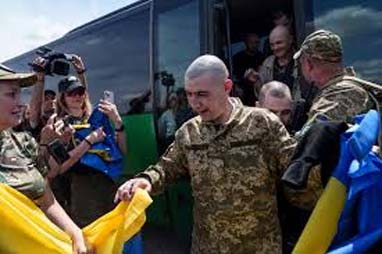In Sumy Region, Ukraine and Russia engaged in a POW exchange, each repatriating 75 captives, marking the first such swap in the last three months, as per officials. Preceding this event, both parties also returned the bodies of their fallen soldiers at the same location.
The Ukrainian prisoners, which included four civilians, arrived in the northern Sumy region aboard several buses. Upon their arrival, they expressed elation, contacting their families to convey their return. Some knelt and kissed the ground, while others draped themselves in yellow-blue flags, embracing tearfully. Many displayed signs of emaciation and inadequate attire.
This exchange of 150 POWs marks the fourth swap this year and the 52nd since Russia’s incursion into Ukraine in February 2022. The United Arab Emirates claimed to have facilitated this latest exchange.
There has been mutual finger-pointing regarding the perceived slowdown in these exchanges.
Ukraine has previously advocated for a comprehensive swap while demonstrations demanding the release of POWs occur weekly across the country. Vitalii Matviienko, a Ukrainian official at the coordinating headquarters for exchanges, affirmed Ukraine’s perpetual readiness.
Tatyana Moskalkova, Russia’s human rights ombudsperson, hinted earlier in the week at Kyiv’s imposition of new demands without providing specifics.
Among those repatriated to Ukraine was Roman Onyschuk, an IT professional who volunteered for Ukrainian forces at the onset of the Russian invasion, subsequently captured in March 2022 in the Kharkiv region.
“I yearn to hear my wife’s voice, my son’s voice. I’ve missed his three birthdays,” Onyschuk expressed. During his over 800 days in captivity, he remained disconnected from his family, unaware of their current whereabouts.
“It’s quite overwhelming,” Onyschuk added.
With this latest exchange, Ukraine has welcomed back a total of 3,210 military personnel and civilians since the conflict’s onset, according to Ukraine’s Coordination Headquarters for Treatment of POWs.
Neither Ukraine nor Russia divulge the exact number of POWs.
Dmytro Kantypenko, captured on Snake Island in the Black Sea during the initial days of the conflict, was among those liberated on Friday. After reaching Ukraine, he promptly informed his mother of his return.
“I’ll be back home soon,” he assured, wiping his tears. He discovered that his wife had fled to Lithuania with their son.
Kantypenko recounted being abruptly roused from sleep by Russians without explanation, given minimal time to change before departure. He claimed they endured electroshock torture shortly before the exchange, corroborated by fellow POWs.
According to UN documentation, a significant portion of Ukrainian captives face consistent medical neglect, severe mistreatment, and even torture while in custody. Instances of mistreatment of Russian soldiers have also been reported, primarily during capture or transit to detention facilities.
Approximately one-third of returning Ukrainians suffer from injuries, severe illnesses, or disabilities, as per the Coordination Headquarters for the Treatment of POWs. Among those repatriated on Friday were 19 fighters from Snake Island, 14 individuals detained at the Chernobyl Nuclear Power Plant, and 10 fighters from the captured city of Mariupol.
Five women were among the returning Ukrainians, including Nataliia Manuilova, a cook in the Azov regiment, who endured over two years of captivity. She recounted being forcibly taken from her Mariupol residence by Russians, blindfolded and bound.
“I despise them. They robbed me of two years of my life,” she declared, embracing her son. “I can hardly believe how much he’s grown.”
The POWs traversed through rural communities before reaching Sumy, where they were transported to hospitals for a two-week rehabilitation period. The convoy passed through verdant fields with freshly dug defensive positions, anticipating potential Russian incursions following Moscow’s offensive in neighboring Kharkiv.
Ukrainians brandishing blue and yellow flags lined the streets, enthusiastically welcoming the returning POWs.
Earlier in the day, Ukraine and Russia exchanged the bodies of their fallen soldiers at the same location, with Ukraine returning 212 bodies and Russia returning 45.
Bohdan Okhrimenko, another official at the Ukrainian POW office, attributed the significant disparity in numbers to an agreement to repatriate more Ukrainian casualties this time.
The warring factions convene solely for the exchange of deceased and prisoners of war, necessitating extensive preparation and diplomatic negotiations.
Vitalii Matviienko, another Ukrainian official from the POW headquarters, recounted instances where exchanges failed due to last-minute changes of heart by the Russian side.
Since the conflict’s inception, Ukraine has repatriated nearly 3,000 bodies, primarily of servicemen, according to Ukraine’s missing persons bureau, with about 1,300 of them identified.
The process of identification and subsequent repatriation for burial sometimes spans weeks.
“While they may not return alive, their memory fuels our resolve,” stated Okhrimenko, “providing solace to their families for a proper farewell.”









